Wikipedia, the truth and the ...eye of Kennedy
The other day I was discussing with another member, the issue of objective and subjective. I wrote that if someone experiences something while others weren't present, it doesn't mean that the event didn't happen.
Obviously it would be a logic fallacy to determine that a personal experience is automatically invalid or that it didn't objectively happen.
Now I will take this argument one step further and demonstrate how blind-spots are created in the "objective" realm of knowledge-databases due to their protocols, and how truth can be controlled through them. In the end I will share a prediction on how our systems might evolve to compensate.
The Kennedy Half Dollar
Before starting, and in order for you to have a proper background on what's coming next, please take some time and see a few images of a Kennedy Half Dollar and more especially the (not so visible) eye of JFK:
https://www.google.gr/search?q=kennedy+half+dollar& (click images)
The coin looks something like this:
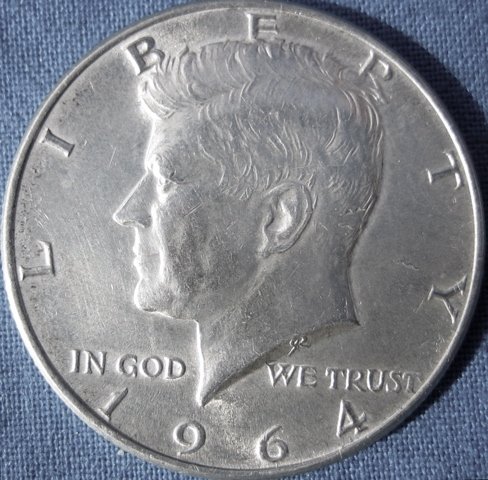
(there are better photos out there, I'm just including one with "reuse" rights)
The eye, in general, is barely visible.
Now let's move on....
The Real eye effect / Glass eye effect of the Kennedy Half Dollar
Years ago, while photographing a few coins, I discovered by accident that the silver Kennedy Half Dollar does something weird when it is struck by a 45' degree light source from the right: The eye of JFK becomes extremely real, almost ...alive. It's like the eye is from glass. The effect can dominate the appearance of the coin because it's so unusual.
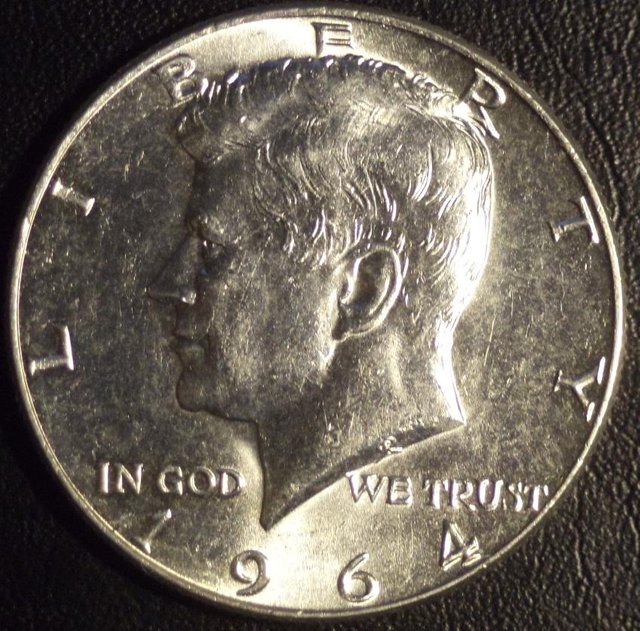
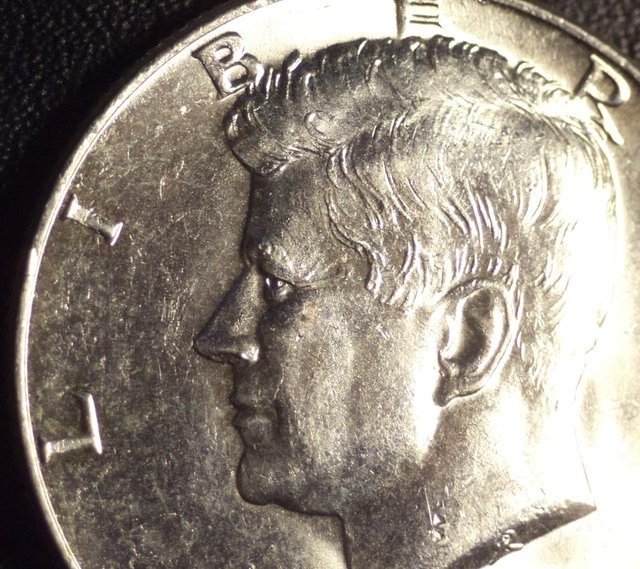

It is almost impossible that this could have been created randomly, yet it would also be peculiar for the engraver to intentionally make this something like ...an easter egg. Plus the eye is not that large. Its details are not that visible while holding the coin in your hand. But if hit from an angled light from the right, you can suddenly see that the eye is glimmering ("glass-eye" reflection) which may attract your attention to see it with a magnifying glass or take a photo.
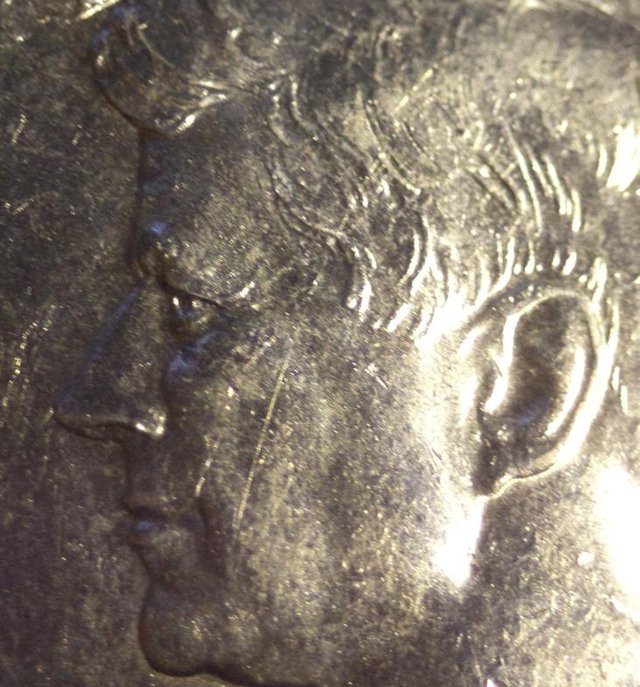
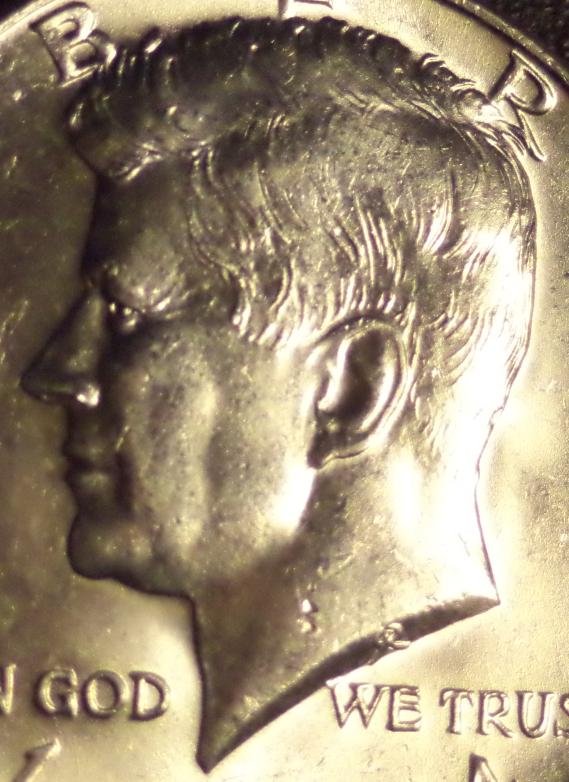
Attempting to list it with Wikipedia
After I got over the "wow" factor, I then started googling around to see what's going on, if other photos have it, if there is any knowledge of the phenomenon in numismatic forums, etc. I didn't find anything, so I then opened a suggestion to Wikipedia to include this. I also posted a photo and instructions for replication.
The responses were:
"...wikipedia is quite strict about not including original research. We not only need reliable sources, but we really do have our hands tied if none exist."
...
"We are supposed to report only what has been reported elsewhere. Your experiment is interesting but really it would have to be reported someplace else for us to use it."
...
"As we require reliable sources for anything in this article per WP:RS, you would have to have your discovery covered by one of those sources, for example a newspaper, before we could list it."
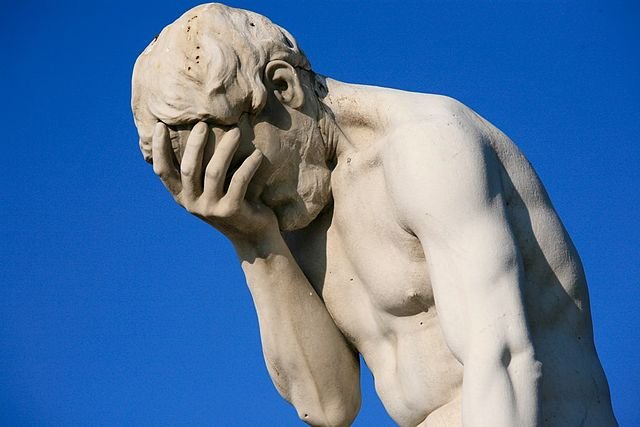
The issue is not the coin: It's who defines truth and how
While I thought I knew how Wikipedia operated, and I'd also heard about the "managing" of controversial issues like 9/11 being edited back-and-forth, etc etc, it never occurred to me how deeply this structure operates in regard to defining what the truth is for the readers. Because, ultimately, this is what we are dealing with...
My reasoning is simple: If I'm faced with skepticism over a photographed item that millions of people can hold in their hand and check out for themselves, with replication instructions that anyone can follow, and then I'm told that this would be a "fact" only after being externally linked, or posted in some newspaper, then this system is so broken that it's not even funny.
Obviously, if the truth can't be written/included with something as simple as that, then one has to wonder what are the criteria when they are managing all the other issues that may be far more complex or involve controversies.
And even if citations exist, then they'll escalate in terms of how "reputable" the citation is. "My source is better than yours", type of. And the bigger the media source, the more "weight" it has in an argument. Yet all large media corps are owned by the Elite.
So if, say, someone wants to define the truth for humanity, they just need to control the main "sources" like big media, scientific journals, etc.
In a nutshell, the equation breaks down as "money = truth" (money controlling the perceived truth).
And since the "protocol" of Wikipedia is to use the money-controlled sources for this, then this equation is valid even for "open" systems like Wikipedia.
So, all this effort to create a supposedly "open" system, where did it lead us? To parrot the mainstream sources and at the same time ignore truth even if that is readily available in front of everyone?
A prediction for the future: A weighted approach in the truth market
I think that the method of only publishing one version of the truth on a given issue will become ...outdated due to market dynamics. Instead of an online encyclopedia that for any controversial issue has a protocol where they decide that the truth is A and not B, what we'll have instead is a multi-pedia that publishes multiple versions of the truth and says:
"Version A has an approval ratio of 95%"
"Version B has an approval ratio of 4%"
"Version C has an approval ratio of 0.9%"
"Version D has an approval ratio of 0.1%"
In some cases it could even be something like 55%-45%, making it clear that there is no clear consensus on what is written as "fact" in the 55% page.
If you are wondering where the market dynamics come into play, let's just say that when you get 4 versions instead of 1, you are actually going for a "superset": You get all the "truth" of a classic wikipedia plus 3 alternatives (that you may or may not want to read). It's like googling for all the info (mainstream and contradictory) and getting it all at once - if you want to go through them. It's like any other market: Why would I take 1 item when I can get 4 items for the same price?
Ultimately, it'll be up to us on whether we want to read a different page (anything beyond the "default" chosen of mainstream version A) instead of some wikipedia moderator making that choice for us by defining what "truth" is... I think this might work out better in the long run. It may sound counter-intuitive to have "many versions of the truth", because everybody knows there is only one truth, but that doesn't automatically mean that our current system is designed to convey that one genuine truth. So with that as a given, a weighted presentation of multiple versions would be much more encompassing and interesting...
"because everybody knows there is only one truth, but that doesn't automatically mean that our current system is designed to convey that one genuine truth."
There is often more than one truth for our limited human minds.
For example:
Yeah, I understand the point. In terms of expression, that would be a problem only in a binary system that requires a 0 or 1 response.
Fortunately a text page that addresses the same issue (whether photons act as waves or particles) would have no problem conveying a message that "both can happen" (in which case that would be the "one truth").
Very interesting, I wasn't aware of wiki's problems with truths either but it doesn't surprise me...
Thanks for sharing the info on the Kennedy Halfs. I find coins very appealing when they are well done, and the U.S. does have some beautiful coins..
Carry on :)
Some times the US mint makes true works of art. While I wouldn't say the kennedy half is one of them, the eye effect is pretty amazing...
@alexgr
Nice read. Truth is subjective because truth is comprised from different points of you and interpetation. I am a science guy myself but this is how the world works.
In science if something is not replicable or falsifiable then it is jargon. And really, most of science is jargon. This is why we have to be so careful with how we talk and how we examine things.
Thing is this wasn't even some kind of scientific finding... It's just a simple coin and they made an overkill requirement - when all they have to do is see the photo or take one themselves. I mean nobody doubts the wikimedia photos as photoshopped nor do they require a vigorous protocol in which these photos are taken under the presence of multiple observers, etc etc.
I guess they'll be waiting for the newspapers to publish it, lol...
That's wild, didn't realize wikipedia functioned like that. I've always taken their info with a grain of salt. Now I have a legitimate reason too.
So basically they are saying, make your content/info popular enough so we can post it.
I'm not saying everything in wikipedia is sketchy (not, by far), but the protocol is "weird" to say the least. Based on what they did for a simple coin that is already photographed and documented, you can imagine what goes on for more complex or controversial issues.
Agreed - it is still a good a source for alot of information.
Interesting about wikipedia. This quote is lols:
About the coin, I have not noticed the eye and I collect pre 1964 halves, now I am going to get out the camera.
It needs light from the right, only then it is visible.
Upload a photo when you are done :D
Awesome!i have to get one of those.
Reading your article was frustrating..the more reason not to rely on wikipedia.
Great article. Truth depends on one's point of view.
I guess I've never taken what wiki anything says is true. It is cool that you be seen the glint in Kennedys eye though.
Brilliant article!
Followed.
hi, can you pls. pls. send me an email at vstream9ATgmail.com I have a few important questions regarding eth. thank you!